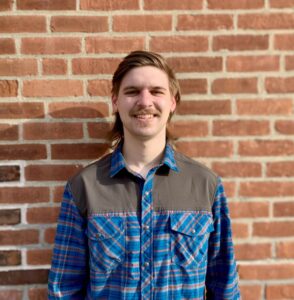We’re taking time to get to know the members of the GSA’s Early Career Scientist Committees. Join us to learn more about our 2021 early career scientist advocates.

David Peede
Multimedia Subcommittee
Brown University
Research Interest
The evolution of species has historically been considered as a bifurcating process; however, the recent influx of genomic studies has challenged this notion, demonstrating that hybridization is not only common in nature but is also a powerful force in shaping the evolution of genomes. One potential outcome of hybridization is a phenomenon known as introgressive hybridization—more commonly referred to as introgression. Introgression is the evolutionary process underlying the integration of heterospecific alleles into a species’ genomic background, which is facilitated by hybridization and many generations of backcrossing. Despite originally being associated with having purely deleterious effects, introgression can also provide the raw genetic material necessary for local adaptation, adaptive radiations, and speciation.
The prevalence of introgression and its subsequent role in the evolution of species has been a longstanding topic of debate in the field of evolutionary genetics. Consequently, empirical hypotheses to assess these viewpoints require accurate tests for introgression. Existing introgression summary statistics are relatively easy to use, computationally efficient, and have been applied to a wide range of eukaryotic taxa. However, these methods utilize only a small portion of the genomic signature produced by introgression, cannot differentiate between introgression and ancestral subdivision, and their statistical efficacy has only been assessed using parameter spaces based on models of human evolution or theoretical models—neither of which reflects the rich diversity of evolutionary histories among eukaryotes. In my current studies, I am utilizing novel site patterns that encompass the entire genomic signature of introgression to develop robust statistics for detecting and quantifying introgression and benchmarking my new statistics against our current methods using simulations that are reflective of the evolutionary histories of mammals, insects, birds, plants, and fishes. In my future work, I will leverage these robust statistics to begin assessing the prevalence of introgression across the Tree of Life to understand its role in the evolution of species. Ultimately throughout my PhD, I hope to answer questions such as: Is introgression a common evolutionary phenomenon in all taxonomic groups? What are the behavioral, ecological, and genetic conditions necessary to facilitate introgression? Are certain regions of the genome more likely to experience introgression than others? Are there regions of the genome impermeable to introgression?
As a PhD-trained scientist, you have many career options. What interests you the most?
I would not be in the position I am in today if not for the mentorship and support I have received throughout my undergraduate training. As an undergraduate, I had the good fortune of being surrounded by brilliant and caring geneticists, which has profoundly influenced my ability to conduct research, ask pertinent questions, and contribute to an inclusive environment. Similar to my undergraduate training, as a graduate student, I have also benefitted from working with extremely intelligent and compassionate geneticists, who are continuously molding me into the best version of myself. Despite having only completed one year of my graduate studies, these two experiences have solidified my resolve to one day become a tenure track faculty member at an R1 research institution.
As a principal investigator of my own laboratory, I hope to leverage my good fortune with mentorship to ensure that my research group fosters compassionate leaders and innovators in the field of speciation genetics. Specifically, I hope to mentor scientists from diverse backgrounds and areas of expertise. I envision my group researching various aspects of speciation at both micro and macroevolutionary time scales. My group will complete said research by using a diverse set of methodological approaches ranging from theory to fieldwork. To one day achieve these goals, I will continue to work relentlessly to advance my knowledge of speciation as well as continuously refine and develop my mentorship philosophy through mentoring undergraduate students.
In addition to your research, how do you want to advance the scientific enterprise?
My decision to pursue a career in science has largely been influenced by my previous and current mentors. I am dedicated to continuing to pay that mentorship forward and in turn, help cultivate the next generation of scientists. In addition, my research is inherently interdisciplinary—encompassing the fields of evolution, genetics, computer science, and statistics—which provides the ideal opportunity to mentor undergraduates. So far at Brown University, I have had the distinct pleasure of mentoring three undergraduates in scientific research, writing, and career development. I have found the mentorship process very rewarding and have enjoyed watching my mentees mature as scientists. Additionally, there has been no better feeling than seeing my mentees achieve their goals, such as a mentee-led publication or when one of my mentees got accepted to their graduate school of choice! So far, all of the undergraduates I have mentored reached out to my PI to become active in research, but in the future, I hope to be more involved in recruiting undergraduates. Specifically, I will recruit undergraduates through programs like Brown University’s Summer Research Early Identification Program—a paid internship that provides undergraduates of historically underrepresented groups with training and mentorship to help them pursue graduate careers in STEM—to tackle the interdisciplinary questions my research focuses.
As a leader within the Genetics Society of America, what do you hope to accomplish?
I joined the GSA’s Early Career Leadership Program because I was particularly excited to help develop podcasting as a more widely used medium for scientific communication efforts. Podcasting is a very popular medium for entertainment and educational purposes yet has been underutilized by scientists. So far, my time on the Multimedia Subcommittee has empowered me with the tools, resources, and experiences necessary to do everything from producing to editing a podcast. I hope to continue to refine my podcasting skills through serving on the Multimedia Subcommittee and leading workshops at future GSA events so that podcasting may one day be the go-to medium for science communicators!
Previous leadership experience
Teaching Assistant: Computational Methods for Studying Demographic History with Molecular Data, Brown University
Undergraduate Mentor, Huerta-Sánchez Laboratory
Undergraduate Mentor, Matute Laboratory
Teaching Assistant: 9th Grade Biology and Earth Science, Charles E. Jordan High School
Teaching Assistant: General Chemistry, UNC-Chapel Hill
Contact Information
Website: david-peede.github.io
Twitter: @david_peede































